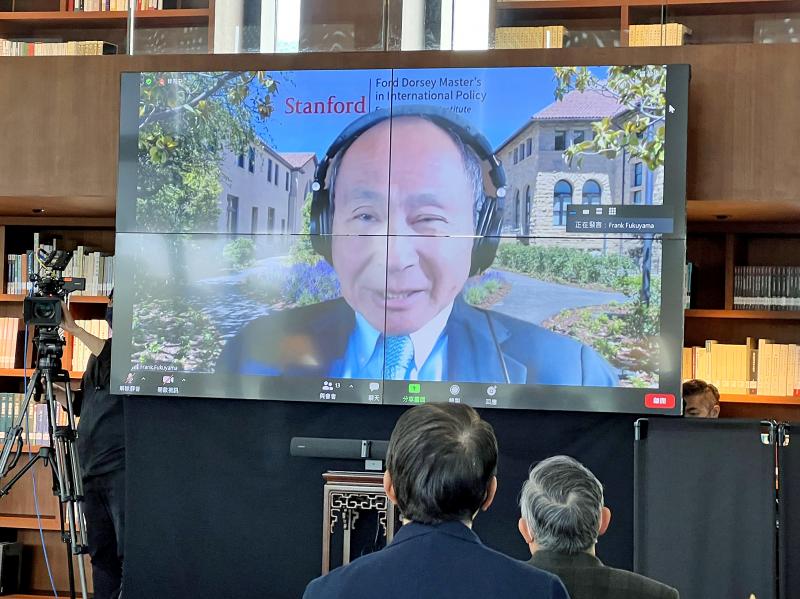Renowned US political scientist Francis Fukuyama yesterday said he thinks Ukrainians are much more willing to defend themselves than Taiwanese, which poses a significant threat to Taiwan’s future and independence.
Fukuyama, the Olivier Nomellini Senior Fellow at Stanford University’s Freeman Spogli Institute for International Studies, made the remarks in a speech titled “Threats to Liberalism and the Liberal World Order” in a virtual forum held by the Taipei School of Economics and Political Science Foundation.
Russia attacked Ukraine because it wants to undo the effects after the collapse of communism in 1991, he said, adding that Russian President Vladimir Putin feels threatened by Ukrainian democracy, which could motivate democratic movements in Russia.

Photo: CNA
“The geopolitical challenge from China is bigger than that from Russia,” he said. “Chinese power is much more multidimensional, in terms of economic, political and increasingly in military powers.”
One domain where Chinese power is not great is in the social and cultural dimension, as non-Chinese in general do not admire its society and do not want to live in the country, he added.
Since the rise of Chinese President Xi Jinping (習近平), China is evolving from an authoritarian to a totalitarian state, with its social credit system being the world’s most advanced surveillance network for the purpose of social control, he said.
International relations are now at an important junction, and depend on how the Russian attack on Ukraine plays out, he said, adding that China is observing how the US and other democracies respond.
Fukuyama also spoke of how the crisis relates to Taiwan’s relations with China.
“We are entering a geopolitical era in which unfortunately we have to take military threats and military power much more seriously,” he said.
“I’m afraid the actions that we thought were unthinkable a few years ago are now thinkable,” Fukuyama said regarding the possibility of China moving its military into Taiwan, adding that Taiwan should rethink its defense policy and reinstate mandatory military conscription.
“I think one of the differences between Taiwan and Ukraine is that, in my perception, the Ukrainians are much more willing to fight for themselves than Taiwanese people, and that poses a really big threat to Taiwan’s future and independence,” he said.
Some Taiwanese believe that the US would protect them in the event of war, but that would only happen if Taiwanese are willing to fight for themselves, he said, adding that the attitudes of Taiwanese and the sacrifices they are willing to make are essential.
Global democracies comprise the greatest share of economic and military power, but a large deficit is that domestic politics in many democratic countries are not supportive of strong international positions, including in the US, he said.

CHAOS: Iranians took to the streets playing celebratory music after reports of Khamenei’s death on Saturday, while mourners also gathered in Tehran yesterday Iranian Supreme Leader Ayatollah Ali Khamenei was killed in a major attack on Iran launched by Israel and the US, throwing the future of the Islamic republic into doubt and raising the risk of regional instability. Iranian state television and the state-run IRNA news agency announced the 86-year-old’s death early yesterday. US President Donald Trump said it gave Iranians their “greatest chance” to “take back” their country. The announcements came after a joint US and Israeli aerial bombardment that targeted Iranian military and governmental sites. Trump said the “heavy and pinpoint bombing” would continue through the week or as long

TRUST: The KMT said it respected the US’ timing and considerations, and hoped it would continue to honor its commitments to helping Taiwan bolster its defenses and deterrence US President Donald Trump is delaying a multibillion-dollar arms sale to Taiwan to ensure his visit to Beijing is successful, a New York Times report said. The weapons sales package has stalled in the US Department of State, the report said, citing US officials it did not identify. The White House has told agencies not to push forward ahead of Trump’s meeting with Chinese President Xi Jinping (習近平), it said. The two last month held a phone call to discuss trade and geopolitical flashpoints ahead of the summit. Xi raised the Taiwan issue and urged the US to handle arms sales to

State-run CPC Corp, Taiwan (CPC, 台灣中油) yesterday said that it had confirmed on Saturday night with its liquefied natural gas (LNG) and crude oil suppliers that shipments are proceeding as scheduled and that domestic supplies remain unaffected. The CPC yesterday announced the gasoline and diesel prices will rise by NT$0.2 and NT$0.4 per liter, respectively, starting Monday, citing Middle East tensions and blizzards in the eastern United States. CPC also iterated it has been reducing the proportion of crude oil imports from the Middle East and diversifying its supply sources in the past few years in response to geopolitical risks, expanding

Pro-democracy media tycoon Jimmy Lai’s (黎智英) fraud conviction and prison sentence were yesterday overturned by a Hong Kong court, in a surprise legal decision that comes soon after Lai was jailed for 20 years on a separate national security charge. Judges Jeremy Poon (潘兆初), Anthea Pang (彭寶琴) and Derek Pang (彭偉昌) said in the judgement that they allowed the appeal from Lai, and another defendant in the case, to proceed, as a lower court judge had “erred.” “The Court of Appeal gave them leave to appeal against their conviction, allowed their appeals, quashed the convictions and set aside the sentences,” the judges